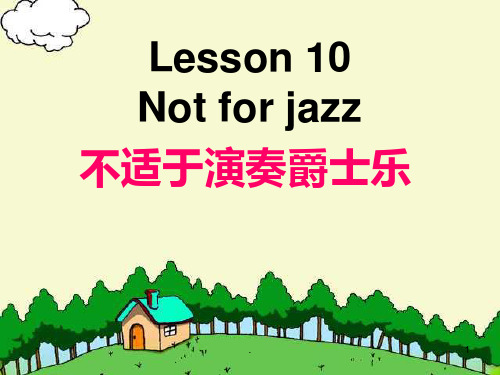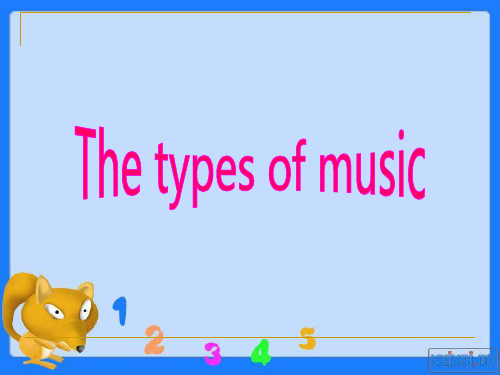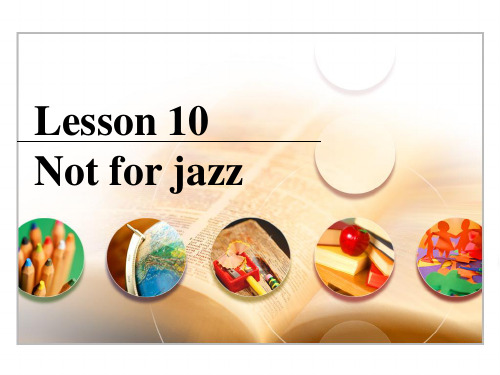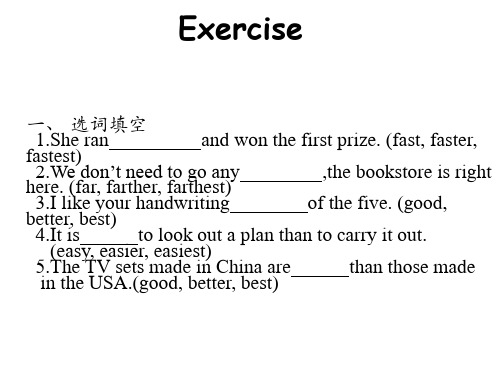新概念英语第2册教学课件 L10
新概念2_Lesson10 (共27张PPT)

结构:
Be + P.P (过去分词)
Football is played all over the world.
时态
被动语态
一般现在时 am/is/are+done
一般过去时 was/were+done
例句 It is called an apple. This bike was bought last month.
★ shock v.使不悦或生气,震惊
sb. shocked at sth. 感到震惊 我对你说的感到震惊。
I was shocked at what you said. sb get a shock 某人很吃惊
★ allow v.允许,让
allow (sb.) to do sth 允许某人做某事 妈妈不让我玩电脑游戏。
双重所有格是为了解决物主代词和某些代词或冠词不能连用 的情况而出现的 (比如你不能说把“我的一本书”说成是“my a book”,只 能是“a book of mine”)。
• 区别如下两句
• 1).This is a picture of my grandfather
• 2).This is a picture of my grandfather's
keep sth + adj 保持… 请保持教室整洁。
Pleas keep the classroom clean. 5. the living room = the sitting room 客厅
It has belonged to our family for a
long time.
6. belong to 属于 这个钢琴属于我的妹妹。 This piano belongs to my sister. The instrument was bought by my
新概念英语第二册课件Lesson20(共29页)

【Key structures】关键句型
• spend+时间+在某地 在某地度过……时间 • I spent a whole day in the room, but I
didn’t write a single word.
• after <conj.>+从句 在……之后 • After <prep.>+ doing 在…..之后 • After I went to school, I learned a lot of
★realize v. 意识到
• ① v. 认识,知道,明白,意识到 • I went into the wrong room without
realizing it. • ② v. 实现(希望、目标、愿望等) • realize one's dream 实现某人的梦想 • ③ 使变为事实,使发生(常用于被动语态) • This plan can never be realized.
• I was worried about my brother for he caught a serious cold.
• Instead of catching fish, they catch old boots and rubbish.
• instead of… 而不是… 可以放于句首或句尾 • I went to school instead of staying at home. • She bought a book for me instead of buying a dress.
新概念英语第二册L10

【Lesson】10Not for jazz【New words and expressions】(11)jazz [dʒæz] n. 爵士音乐musical ['mju:zikəl] adj. 音乐的instrument ['instrumənt] n. 乐器clavichord ['klævikɔ:d] n. 古钢琴recently ['ri:səntli] adv. 最近damage ['dæmidʒ] v. 损坏key [ki:] n. 琴键string [striŋ]n. (乐器的)弦shock [ʃɔk] v. 使不悦或生气,震惊allow [ə'lau] v. 允许,让touch [tʌtʃ] v. 触摸1、jazz [dʒæz] n. 爵士音乐a kind of music2、musical ['mju:zikəl] adj. 音乐的musical student 有音乐天赋的人music ['mju:zik] n. 音乐,乐曲music student 学音乐的人(the student who learned music)3、instrument ['instrumənt, 'instrə-, -ment]n. 乐器instrument=musical instrumentinstrument常用的意思是“器械”、“器具”,尤指医疗、机器等方面的。
也可用来泛指各种乐器。
4、clavichord ['klævikɔ:d] n. 古钢琴, 不是现代的pianoa kind of instrument5、recently['ri:səntli] adv. 最近recently=lately6、damage ['dæmidʒ] v. 损坏① n. 损害,损失,伤害The storm has done a lot of damage to the village.② vt. 损害,毁坏,损坏The car was badly damaged in the accident.7、key [ki:]① n. 琴键② n. 钥匙,答案key to the door 门钥匙Do you know the key to the question?③ adj. 关键的key structure8、shock [ʃɔk] v. 使不悦或生气, 震惊① v. 使不悦或生气, 震惊跟人的情绪有关的动词的宾语往往是“人” (以sth.为主语)The news shocks me. 这个消息使我震惊② adj. 令人震惊的It is shocking.③ adj. 感到震惊凡是能够用“人” 做宾语, 又是表示人的情绪活动的动词, 有两个形容词形成:令人……(V+ing);感到……(V+ed)I'm shocked.④ n. 震惊get a shocksb. get a shock 某人很吃惊【辨析】:shock 必指坏事, 令人不悦, 生气的surprise 好事坏事都可以, 只要你没有料到的I want to give you a surprise.9、allow [ə'lau] v. 允许, 让allow doing sth.Smoking is allowed.=people allow smokingallow sb. to do sth. / sb.be allowed to do sth.allow常用于被动语态You are allowed to smoke(被动语态)You are not allowed to enter the room if you don't take the card with you10、touch v. 触摸① vt.&vi. 触摸,碰You are not allowed to touch the vase.② vt. 谈及,涉及,关系到A rise in the cost of living touches everyone.生活费用的增加与每个人都有关系。
新概念英语二课件L20

instead of
2.1 Listen, repeat and check.
06 I am even less lucky.
less lucky
2.1 Listen, repeat and check.
11 I'm not really interested in fishing.
be interested in fishing
2.1 Listen, repeat and check.
12 I am only interested in sitting in a boat and doing nothing at all!
New Concept English II Lesson20
One man in a boat
脑洞英语出品
TOGETHER, let’s make education better!
Partห้องสมุดไป่ตู้1
Warm Up
1.1 Look, think and answer.
What's the writer's favourite sports?
图片复制到这里
1.1 Look, think and answer.
Why some fishermen are unlucky?
图片复制到这里
1.1 Look, think and answer.
What do the writer's friends advise him?
图片复制到这里
1.2 Watch the video.
新概念英语第二册lesson20one-man-in-a-boatPPT课件

1
fisherman
Hale Waihona Puke -21.fisherman: person who catches fish for a living or for pleasure. (fisher)
pl. fishermen fishery
E.g. Some fishermen are unlucky.
What does he do?
-
20
interested in…
My friends say
-
21
The most important thing is relaxation and enjoying a peace of mind . Keep good mood every day!
-
22
Thanks
-
23
Fishing is my favourite sport.
What’s his job?
What’s he? -
3
2.catch v. caught, caught
1) I often fish for hours without catching anything.
2) You look terrible. You must catch a cold.
Seeing is believing.
Reading in bed is something I always enjoy.
Watching television is my favourite pastime.
-
24
I often fish for hours without catching anything.
-
新概念二Lesson-10PPT课件

.
23
2. 双重所有格:of 与名词所有格或名词性 物主代词同时使用表示所有关系
.
24
形式:1)of + 名词所有格 他是我爸爸的一个朋友。 He’s a friend of my father’s.
2)of + 名词性物主代词 你真不够朋友。 You are no friend of mine.
.
7
key cn. 琴键,钥匙
key to + n. …的钥匙,…的关键 门钥匙 the key to the door 问题的答案 the key to the question
.
8
shock v. 震惊, 使不悦, 生气
(与人的情绪有关的动词宾语往往是 人 )
这个消息使我震惊。The news shocks me.
15
时态
主动语态
一般现在时 do/does
一般过去时 did
被动语态 is/am/are done was/were done
一般将来时 will/shall do will/shall be done
过去将来时 would/
should do
would/ should be done
现在进行时 is/am/are doing is/am/are being done
Lesson 10 Not for jazz 不适于演奏爵士乐
.
1
Words
jazz / ’dӡ æz/ n. 爵士音乐 musical / ’mju:zikəl/ adj. 音乐的 instrument / ’instrumənt/ n. 乐器 clavichord / ’klævikɔ:d/ n. 古钢琴 recently / ’ri:səntli/ adv. 最近 damage / ’dæmidӡ/ v. 损坏
新概念二册L10课件ppt

二、单项选择
1.Have you ever the English Speaking Contest held by CCTV?
A. enter
B. entered for C. entered D. entered into
2.John did in the exam, Tom did even .
be made by 表示制造人 This cake is made by my sister.
Exercise
一、选词填空
made of made from made in made by
1.All the furniture in this room was made by my grandfather. (500)
Suddenly someone_s_h_o_ut_e_d_. 'It's two minutes past twelve! The clock has_s_t_o_p_p_ed__!' I _lo_o_k_ed__at my watch. It was true. The big clock _r_e_fu_s_e_d_to _w__el_c_om__e__the New Year. At that moment, everybody b_e_g_a_n_to _la_u_gh__and _s_in_g__.
the key to the front door 前门钥匙
a key to the exercise 练习题答案
allow v. 允许
allow sb to do sth
允许某人做某事
touch v. 触摸 a near touch 千钧一发
新概念二L10课件

被动语态:be + 动词的过去分词
1 It is calleds made in Germany in 1681.
3Our clavichord is kept in the living room. 4Recently it was damaged by a visitor.
★shock v. 使不悦或生气, 震惊 跟人的情绪有关的动词的宾语往往是 “人” (以sth为主语) The news shocks me 这个消息使我震惊, 凡是能够用 “人” 做宾语, 又是表示人的情 绪活动的动词, 有两个形容词形成 : ★令人……; + -ing 2.感到…… + -ed It is shocking.I'm shocked. sb.get a shock surprise 好事坏事都可以, 只要你没有料到 I want to give you surprise. shock 必指坏事, 令人不悦, 生气的
5It is being repaired by a friend of my father’s.
背诵图
★jazz n. 爵士音乐 a kind of music ★musical adj. 音乐的 music student : the student who learned music musical student :有音乐天赋的(当与人连用时 ★instrument n. 乐器 instrument=musical instrument ★clavichord n. 古钢琴, 不是现代的piano a kind of instrument
新概念第二册 PPT 课件

旅游英语
将课程内容与旅游场景相 结合,教授学生在旅游过 程中如何运用英语进行沟 通和表达。
课程实践活动的组织与实施
小组讨论
组织学生进行小组讨论,培养学 生的团队协作和沟通能力,提高 学生的口语表达和听力理解能力
。
角色扮演
组织学生进行角色扮演活动,模拟 真实场景中的对话和交流,培养学 生的口语表达和听力理解能力。
倒装句。
03
课程实践与应用
听说读写各项技能训练
听力训练
通过播放英语音频材料,训练 学生的英语听力理解能力,提 高语音识别和信息捕捉能力。
口语训练
通过模拟真实场景的对话练习 ,培养学生的英语口语表达能 力,增强自信心和沟通技巧。
阅读训练
通过阅读英文文章和短篇小说 ,提高学生的阅读理解能力和 词汇量,培养阅读兴趣和习惯 。
03
和英语能力,以便更好地引导学生学习。
如何根据学生需求选择合适的教材
了解学生需求
在选择教材之前,教师应了解学生的 学习目标、英语水平、兴趣爱好等,
以便选择最适合学生的教材。
考虑学生的实际生活经验和背景,选 择更贴近学生需求的教材。
比较不同教材的特点
教师应对各种教材进行比较,了解其 特点、难度、教学方法等,以便为学 生选择最适合的教材。
教学内容:都涵盖了语法、词汇、阅读、听力等语言学习的各个方面。
与其他教材的异同点分析
• 教学方法:都采用了多种教学方法,如任务型教学、情景 教学等。
与其他教材的异同点分析
01
不同点
02
教材内容:新概念第二册与其他教材在内容上有所不同,新概念第二 册更注重实际应用,话题更贴近生活。
03
难度:新概念第二册的难度相对于其他教材略高,语法点和词汇量更 大。
新概念英语二册L30

cut: have a hair cut 理发 cut down the tree 砍倒树 cut in 切入,插嘴 cut off 切掉
• I like sitting by the Wayle on fine afternoons. on: 表示具体日子或者早中晚,都用on
• Like doing 习惯性的 I like drinking water. to do 一次性的 I like to drink tea. • By the Wayle:在河边
nearly sight /5nI[l /saIt/ i/
New words
polo Wayle 名) /5p[Jl[J/ /weIl/
n.水球
n. 威尔
(cut, cut) v.穿过
cut
row kick towards nearly sight
/kQt/
/r[J/ /kIk/ /t[5wC:dz/ /5nI[li/ /saIt/
• There‘s some milk in the fridge. • Is there any soap in the bathroom? 当疑问句表示请求时,用some
Can I have some coffee?
• The fell into the water.
雨下的太大了以致我们不能出去。 It rained so hard that we couldn’t go out.
新概念2 L10-12

3. Students _____ slippers when they are at school. A. don’t allow to wear B. are not allowed to wear C. are not allowed wearing 4. --How clean and tidy your classroom is ! --Thank you. It _____every day. A. is cleaned B. was cleaned C. was cleaning D. is cleaning
What party do you belong to?
Belong to既不能用于进行时, 又不能用于被动。
damage
① n. 损害,损失,伤害 The storm has done a lot of damage to the village. ② vt. 损害,毁坏,损坏 The car was badly damaged in the accident.
key ① n. 琴键 ② n. 钥匙,答案 门钥匙 key to the door 题的答案 Do you know the key to the question? ③ adj. 关键的 key structure
shock
① v. 使不悦或生气, 震惊 这个消息使我震惊 The news shocks me. ②n. 震惊 sb. get a shock ③ adj. 感到震惊 令人……(V+ing); 感到……(V+ed) I'm shocked. It is a shocking news.
2019年新概念第二册lesson20(共47张PPT)语文

4.He congratulated me. I won the competition. 他向我道贺. 我赢得了这次比赛.
• He congratulated me on winning the competition. 在我赢得这次比赛之际, 他向我祝贺.
• I often fish for hours without catching anything.
for+时间 表示一段时间 for hours=for some hours 数小时
without catching anything作为状语而出现, 表示结果 状语。
without是介词,后面一定要加宾语, 动名词catching作 without的宾语,without 后面的动作是主语来做的。 动名词也有动词的特性,可以有自己的宾语。
• I am even less lucky.
• less是little的比较级,意为“不及,不如,更少” • I spend less time on English than on French. • less+原形 A is less…than B A不如B
• After having spent whole mornings on the river, I always go home with an empty bag.
他看了一下手表. 他匆忙赶到火车站.
• After looking at his watch, he hurried to the station. 他看了一下手表之后, 就匆忙赶往火车站.
• Or: After having looked at his watch, he hurried to the station.
新概念英语二册NCE2L10课件

2.1 Listen, repeat and check.
11 Now we are not allowed to touch it.
be not allowed to
2.1 Listen, repeat and check.
12 It is being repaired by a friend of my father's.
A letter was delivered this morning.
this morning
a was delivered
letter
3.5 Exercises C: Transform the sentences.
I ______ (give) a present.
I was given a present.
09 She struck the keys too hard and two of the strings were broken.
struck the keys two of the strings
2.1 Listen, repeat and check.
10 My father was shocked.
be made in
2.1 Listen, repeat and check.
04 Our clavichord is kept in the living room.
in the living room
2.1 Listen, repeat and check.
05 It has belonged to our family for a long time.
1
2
3
43.3 ຫໍສະໝຸດ iscover the structure.
新概念二册L10课件

钥匙,答案
the keys of a piano 钢琴琴键 the key to the front door 前门钥匙
a key to the exercise 练习题答案
allow v. 允许 allow sb to do sth
允许某人做某事
touch v. 触摸
a near touch
千钧一发
one of my father’s friends
a book of his = one of his books
a dress of mine = one of my dresses
Focus on grammar
被动语态
• It is called a clavichord. • It was made in Germany in 1681. • Our clavichord is kept in the living room.
பைடு நூலகம்
made by my grandfather. (500) (700) (400)
3.That is a perfume made from the oil of this plant.
France and in fashion here
6.This valuable violin was made by a famous Italian violin-maker. (500) 7.The violin was made of a special wood. (600) 8.The strings of the violin are made of wire and other things.
I try to study hard. 我努力好好学习。
新概念2_Lesson10(共32张PPT)

Made the sentences
1. the music - composed – a German The music was composed by a German.
19
·高中新课标总复习(第1轮)·英语 ·浙江 · 人教版
立足教育 开创未来
Prisoners of war built this bridge in 1942?
When was this bridge built?
This bridge was built in 1942.
Who built this bridge? Prisoners of war built this bridge. This bridge was built by prisoners of war.
What did she try to play on it?
She tried to play jazz on it!
12
课文精讲
1、It is called a clavichord.
call在这里的意思是“把……称为”、“称呼”, 既可用于主动态,也可用于被动语态。
call sb. sth. / sb. be called 称某人为……,什么被称为…… What do you call this? 你们把这称为什么?
12. 属于
__b_e_lo__n_g___
11
L·高is中t新e课标n总复t习o(第t1h轮)e·英t语a·p浙江e·,人a教n版 d figure out : 立足教育 开创未来
新概念2_Lesson10(共22张PPT)

clavichord
Lesson 10 Not for jazz
➢ Passive voice: 被动语态
结构: be (am, is, are, was, were) + P.P(动词 过去分词) e.g.: Bill每天吃一个苹果.
Bill eats an apple every day. e.g.:苹果被Bill吃了.
That desk/ table was made by my grandfather.. “行为主体”也可以不表示出来: e.g.: 这架钢琴是英国造的.
The piano was made in England.
e.g.:这辆车是上星期修的.
The car was repaired last week.
What kind of instrument do we have? We have an old musical instrument. What’s it called? It is called clavichord. Where and when was it made? It was made in Germany in 1681. Where is our clavichord kept? Our clavichord is kept in the living
Wቤተ መጻሕፍቲ ባይዱrd study
与made相关的几个介词: 1. made in: 可表示产地或时间
This bike was made in China. 这辆自行车是中国造的。 It was made in 1988. 它生产于1988年。
2. made of: 表示某种材料制成(通常指制造后 不改变该材料原来的性质或形状):
- 1、下载文档前请自行甄别文档内容的完整性,平台不提供额外的编辑、内容补充、找答案等附加服务。
- 2、"仅部分预览"的文档,不可在线预览部分如存在完整性等问题,可反馈申请退款(可完整预览的文档不适用该条件!)。
- 3、如文档侵犯您的权益,请联系客服反馈,我们会尽快为您处理(人工客服工作时间:9:00-18:30)。
Not for jazz
Not for jazz
• We have an old musical instrument. It is called a clavichord (翼琴). It was made in Germany in 1681. Our clavichord is kept in the living-room. It has belonged to our family for a long time. The instrument was bought by my grandfather many years ago. Recently it was damaged by a visitor. She tried to play jazz on it! She struck the keys too hard and two of the strings were broken. My father was shocked. Now we are not allowed to touch it. It is being repaired by a friend of my father's.
Grammar: 被动语态
• 构成:
• S.(受动) + be + v.-ed (过去分词) by ...(施动) • The glass is broken. (一般现在时)
• The glass was broken by my brother. (一般过去时)
• 对比:
• She lost her keys. • The keys were lost. • My mother bought a cake. • The cake was bought by my mother.
课文讲解
• It is being repaired by a friend of my father's. 被 动语态(现在进行时) • 强调很多当中的一个或几个的时候, 选用双重属 格结构 • a friend of my father's(双重所有格) • = one of my father’s friends(’s所有格) • a friend of my father(of所有格) • = My father has only one friend
Grammar: 被动语态
• 被动语态 Vs. 完成时态
• 构成:
• 被动语态:S.(受动) + be + v.-ed (过去分词) by ...(施动) • 完成时态:S.(施动) + have / has / had + v.-ed (过去分词) • It has belonged to our family for a long time.
课文讲解
• She struck the keys too hard and two of the strings were broken. 被动语态(一般过去时) • key n. 琴键 • ① n. 琴键 • ② n. 钥匙,答案 • key to the door 门钥匙 • Do you know the key to the question? • ③ adj. 关键的 key point
课文讲解
• Recently it was damaged by a visitor. 被动语态(一般过 去时) • recently adv. 最近 recently = lately • damage v. 损坏 • ① n. 损害,损失,伤害 • The storm has done a lot of damage to the village. • ② vt. 损害,毁坏,损坏 • The car was badly damaged in the accident. • She tried to play jazz on it! • play n. 玩,演奏(乐器等) • ① 跟球类连用, 直接+球类; • ② 跟乐器连用, +the+乐器, 演奏乐器而非音乐 • ③ play music on + 乐器 , 一定要用 “on”
课文讲解
• We have an old musical instrument. It is called a clavichord. • call在这里的意思是“把……称为”,“称呼”,既可用于 主动态,也可用于被动语态。
• What do you call this?
• 你们把这称为什么? • Please call me Liz.
课文讲解
• It has belonged to our family for a long time. • belong 是一个表示状态的动词,而不是行为动 词,所以不能用于进行时,常用的时态是一般现 在时和过去时。 • This farm belongs to me and it belonged to my father before me. • Does this pen belong to you? • -Yes, it belongs to me. • -Where do these chairs belong? • -They belong in the other room.
课文讲解
• My father was shocked. • shock v. 使不悦或生气, 震惊 • ① v. 使不悦或生气, 震惊 • The news shocks me. 这个消息使我震惊 • ② adj. 令人震惊的; 感到震惊 • It is shocking. • I'm shocked. • ④ n. 震惊 sb. get a shock 某人很吃惊 • shock 必指坏事, 令人不悦, 生气的 • surpriou surprise.
课文讲解
• Now we are not allowed to touch it. 被动语态(一般现在时) • allow sb. to do sth. 准许某人做某事。 • Please allow me (to serve you). • allow doing sth. allow v. 允许, 让 • allow常用于被动语态 • You are allowed to smoke(被动语态) • You are not allowed to enter the room if you don't take the card with you. • touch v. 触摸 • ① vt.&vi. 触摸,碰 • You are not allowed to touch the vase. • ② vt. 谈及,涉及,关系到 • A rise in the cost of living touches everyone. • 生活费用的增加与每个人都有关系。
• The instrument was bought by my grandfather many years ago. • Recently it was damaged by a visitor.
• Now we are not allowed to touch it. • It is being repaired by a friend of my father's.
课文讲解
• Our clavichord is kept in the living room. 被动语态( 一般现在时)
• living room 起居室、客厅。 • keep 保存,存放。 • Please keep your bank card in a safe place. • Can you keep the secret? • You can keep the book for a week. • What kept you? • 【回顾Lesson 7】 • Some detectives were keeping guard at the door. 执 行,守卫。
• 请叫我丽丝。
• Shakespeare is called the Father of English Play. • 莎士比亚被称为英戏剧之父。
课文讲解
• It was made in Germany in 1681. 被动语态( 一般过去时) • be made in + 制造时间/产地 • It was made in Germany. • be made by + 制造人 • This cake was made by my sister. • be made of + 可见原材料 • The tea pot is made of silver. • be made from + 不可见原材料 • Paper can be made from wood.
课文讲解
• The instrument was bought by my grandfather many years ago. 被动语态(一般过去时) • Recently it was damaged by a visitor. 被动语态( 一般过去时) • My father was shocked. 被动语态(一般过去时) • be shocked 通常是对坏消息的震惊: • I was shocked when I heard about the terrible accident. • be surprised 通常是对好消息的震惊: • I was surprised when he gave me the gift.
单词词组
musical instrument 乐器
be called
be made in be made of be made from be made by
被称为
